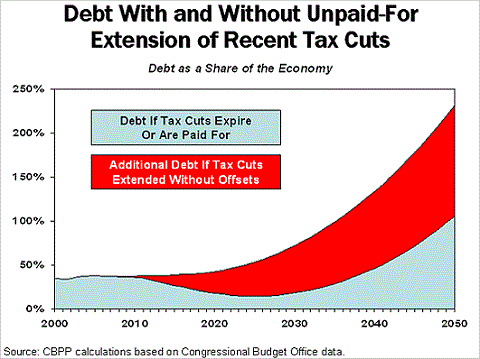
 I'm not saying all of the Bush-era tax cuts are necessarily bad, or that they should not be temporarily renewed during this recession. I'm just pointing out the inconsistency of championing both deficit reduction and the extension of massive tax cuts.
I'm not saying all of the Bush-era tax cuts are necessarily bad, or that they should not be temporarily renewed during this recession. I'm just pointing out the inconsistency of championing both deficit reduction and the extension of massive tax cuts.Meanwhile, Obama signed into law the Wall Street reform bill today. This brings the list of his legislative accomplishments to: Wall Street reform, health care reform, stimulus package (too small, it turns out, but still very important), the much-needed overall of the student-loan system, the Lily Ledbetter Fair Pay Act, new credit card industry regulation, a national service bill, expanded stem-cell research, and the land-protection act. Not bad, not bad at all. Of course, if we don't get more jobs soon, nobody will care.
2 comments:
More Kyle bait I presume...I'm biting.
It seems today's liberals have the view that raising tax rates increase tax revenue, period. With this view in mind, your post is completely accurate. If this were completely true, then I would have no problem raising the taxes on the wealthy and cutting the deficit. Easy enough solution. The problem is there is not a consensus on this point of view, and to effectively attack the right on this issue, liberals must address our differing opinion on the matter.
Most conservatives believe that raising taxes on the wealthy can decrease revenue, and cutting taxes can increase revenue. And history has our back in many instances:
http://www.heritage.org/Research/Reports/2003/08/The-Historical-Lessons-of-Lower-Tax-Rates
I don't think it's as black and white as either side wants it to be. But my point is only that for either side to criticize the other on tax policy, this issue must be addressed...because it is fundamental difference in opinion that defines the arguments.
Hi Kyle,
Great! Let me reel you in then.
I agree that sometimes taxes can be too high, hurt growth, and eventually hurt revenue. Much depends on the type of taxes, when the tax cuts are impletemented, and so forth.
Whatever the case, we need to look at the specifics of the Bush tax hikes. Did those increase revenue? Bush and his economic people predicted they would. But they did not. Not even close. Instead of increasing revenue, they decreased revenue by $1.5 trillion, just as the CBO predicted they would, and were the largest contributor to current deficits. In this case, it actually is black and white.
For a discussion, look at the writings of Bruce Bartlett, who was Ronald Reagan's chief economic adviser. He writes:
"During the George W. Bush years, however, I think SSE (Supply Side Economics) became distorted into something that is, frankly, nuts--the ideas that there is no economic problem that cannot be cured with more and bigger tax cuts, that all tax cuts are equally beneficial, and that all tax cuts raise revenue. These incorrect ideas led to the enactment of many tax cuts that had no meaningful effect on economic performance. Many were just give-aways to favored Republican constituencies, little different, substantively, from government spending."
See also:
http://www.nytimes.com/2007/04/06/opinion/06bartlett.html?_r=1
http://www.capitalgainsandgames.com/blog/bruce-bartlett/1168/supply-side-economics-rip
Post a Comment